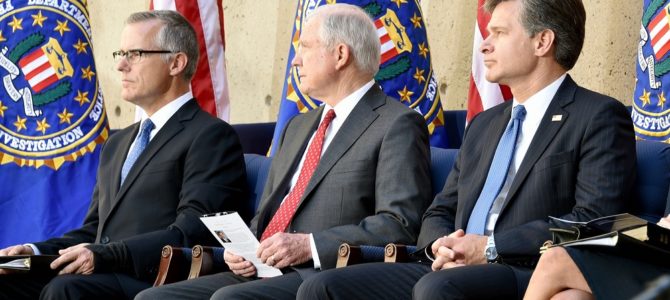
The FBI’s top brass initiated conversations with a White House official that were quickly leaked to CNN, according to a new book.
Deputy FBI Director Andrew McCabe asked to speak privately with White House chief of staff Reince Priebus following a February 2017 intelligence briefing. The scene is described in “Media Madness,” Howard Kurtz’s new book on the press and its relationship with the Trump administration. McCabe said he asked for the meeting to tell Priebus that “everything” in a New York Times story authored by Michael S. Schmidt, Mark Mazzetti, and Matt Apuzzo was “bullsh-t.”
The story was yet another one of those anonymous “bombshells” you’ve heard so much about during the Trump era. It was headlined “Trump Campaign Aides Had Repeated Contacts With Russian Intelligence” and was sourced to not one, not two, not three, but four “current and former American officials.” It was just like every other similar story Americans have read or seen in the past year — no indication that the three reporters had verified, much less seen, the underlying evidence, but lots of threatening language insinuating treasonous collusion between the Trump campaign and Russia, all sourced to high-ranking but anonymous officials.
CNN’s Pamela Brown, Jim Sciutto, and Evan Perez reported a very similar story, also sourced to anonymous officials. Sciutto is a former Obama administration appointee who is close to Obama administration officials. Perez has extensive ties to Fusion GPS, the Democrat-funded firm that created the Russia narrative.
McCabe claimed to want Priebus to know the FBI’s perspective that this story was not true. Priebus pointed to the televisions that were going non-stop on the story. He asked if the FBI could say publicly what he had just told him. McCabe said he’d have to check, according to the book.
McCabe reportedly called back and said he couldn’t do anything about it. Then-FBI director James Comey reportedly called later and also said he couldn’t do anything, but did offer to brief the Senate Intelligence Committee on the matter later that week, suggesting they’d spill the beans publicly. You’ll never guess what happened next, according to the book:
Now, a week later, CNN was airing a breaking news story naming Priebus. According to ‘multiple U.S. officials,’ the network said, ‘the FBI rejected a White House request to publicly knock down media reports about communications between Donald Trump’s associates and Russians known to U.S. intelligence.’
Priebus was stunned by the implication that he was pressuring law enforcement. Had he been set up? Why was the FBI leaking this information when one of its top officials had initiated the conversation?
CNN’s story was authored by Sciutto, Perez, Shimon Prokupecz, Manu Raju, and Brown. Raju is the reporter who later messed up a massive Russia-collusion story by not verifying underlying details in any serious way. He has not explained how he got the story wrong or done anything to regain credibility lost by running a blatantly false story.
The story is sourced to a “U.S. law enforcement official” who seems to know an awful lot about McCabe (e.g. “A law enforcement official says McCabe didn’t discuss aspects of the case but wouldn’t say exactly what McCabe told Priebus.”) The story suggesting obstruction is explosive:
The direct communications between the White House and the FBI were unusual because of decade-old restrictions on such contacts. Such a request from the White House is a violation of procedures that limit communications with the FBI on pending investigations…
The Trump administration’s efforts to press Comey run contrary to Justice Department procedure memos issued in 2007 and 2009 that limit direct communications on pending investigations between the White House and the FBI…
The effort to refute the CNN and New York Times stories came as increasing numbers of congressional members were voicing concern about Russia’s efforts to influence individuals with ties to Trump.
This story dropped just days after the earlier story alleging nefarious contacts between the Trump campaign and Russia. It was part of a long campaign to suggest that President Trump was a traitor who colluded with Russia to steal an election. That was, in fact, the major theme of media coverage throughout 2017.
In June, Comey testified that the original story was “not true,” though The New York Times said their original sources inside the bureau checked out. There seems to be a disparity between what FBI officials tell reporters under the cloak of anonymity and what they admit under oath or to those who are more knowledgeable of the matters at hand. Opponents of President Trump, be they the media, Democratic activists, or Never Trump Republicans, are moving on from Russia conspiracies to claims of obstruction of justice.
This story gives a glimpse into how that original Russia narrative may have been spread around to overly compliant journalists and other members of the “resistance.” It was the hysteria surrounding this and other stories that led the White House to be frustrated with a law enforcement agency and chief playing games. As Comey admitted under oath, he did tell President Trump three times that Trump was not under investigation. These private statements to Trump occurred while Comey publicly insinuated the opposite. This story above fits the same pattern.
Partisan operatives in or close to the FBI communicated snippets of information with reporters who didn’t demand proof or substantiation, then FBI officials denied to White House officials who knew the facts that they were seeding that information, then officials suggested that White House operatives were obstructing justice by asking for the truth to out. At a time when people are looking for patterns, this is a pattern of improper behavior that deserves focus from the media.








